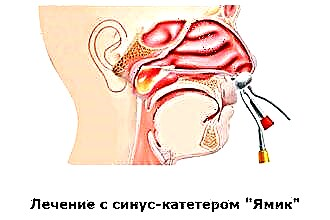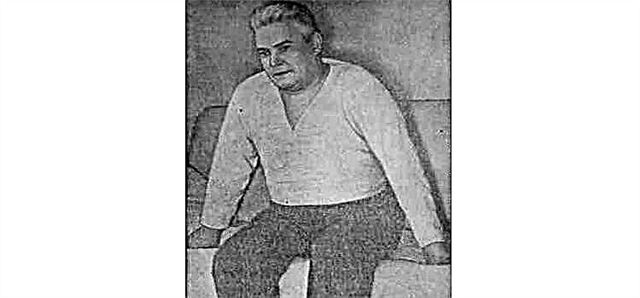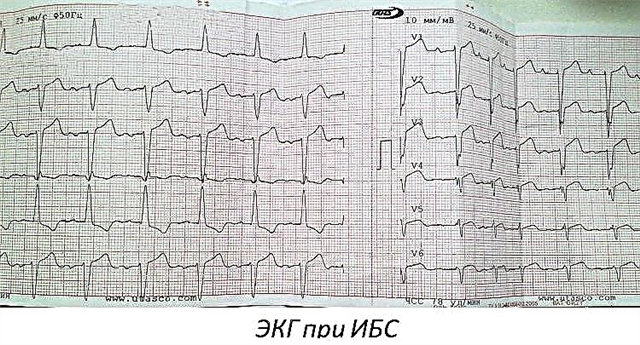When the cough is accompanied by a high fever, the first reaction is usually to take antipyretic drugs. Sometimes this is really necessary, but in most cases, such self-medication works on the side of the disease. So what to do if you have a sore throat, cough and fever?
A little about temperature
 Let's first figure out when and how to bring down the temperature and why it appears. High temperatures create unfavorable conditions for the reproduction of pathogenic microorganisms, which can be the main cause of the disease. By reducing it, we contribute to the development and spread of infection. Therefore, if a cough accompanies a temperature of up to 38, you do not need to knock it down.
Let's first figure out when and how to bring down the temperature and why it appears. High temperatures create unfavorable conditions for the reproduction of pathogenic microorganisms, which can be the main cause of the disease. By reducing it, we contribute to the development and spread of infection. Therefore, if a cough accompanies a temperature of up to 38, you do not need to knock it down.
With some infectious diseases, the temperature is 39 and even higher. This already becomes dangerous and does not bring relief to the patient. The intense heat dehydrates the body, and as a result, the mucus becomes thicker and thicker. At the same time, trying to moisturize dry mucous membranes, the body produces more of it. Sputum accumulates in the lungs and bronchi, makes breathing difficult, provokes a suffocating cough.
In this situation, you need to drink as much water as possible. Better than herbal decoctions, which have an anti-inflammatory effect and help lower the temperature: chamomile, raspberry, elecampane, coltsfoot. You can take "Aspirin", "Ibuprofen", "Paracetamol".
Analgesics bring down the temperature well, but they negatively affect the heart and liver. As soon as the temperature stabilizes around 38 degrees, stop taking antipyretics immediately and continue drinking plenty of fluids.
You can also reduce the temperature without pills using proven folk methods:
- wipe the patient with a cloth soaked in vinegar diluted in half with water;
- put on a towel soaked in water (you can add vinegar);
- lower the hands (in no case legs) of the patient into a bath of cold water.
If the body temperature exceeds 40 degrees, you will have to call an ambulance. It can become a threat to the patient's life. At 42 degrees, the process of denaturation (folding) of proteins begins. But even at a lower temperature, a patient prone to thrombosis may experience cardiac dysfunction (for whom it is difficult to push thickened blood through the vessels), a heart attack or stroke (in those suffering from hypertension).
Cough reasons
There are only three main reasons why a cough may appear. These are allergies, throat irritation (physical or chemical) and infectious diseases. Also, a cough can be a symptom of chronic diseases, sometimes completely unrelated to the respiratory system (for example, heart and stomach). A cough with a temperature in 90% of cases is a companion of a viral or infectious disease.
Most often, severe cough, fever, and sore throat indicate:
 ARVI - a dry barking cough irritates the larynx, and the virus causes its inflammation;
ARVI - a dry barking cough irritates the larynx, and the virus causes its inflammation;- acute bronchitis - if the disease progresses rapidly, it descends into the bronchi;
- sinusitis - the maxillary sinuses are clogged with purulent mucus, which flows down the back wall of the larynx and causes a cough;
- tracheitis - severe inflammation of the trachea;
- diphtheria is a dangerous infectious disease characterized by asthma attacks;
- pneumonia - a deep, strong cough, with wheezing, in which sputum is hardly coughing up.
Some of these diseases at an early stage manifest themselves as a cough with a temperature of 37.2, a maximum of 37.5, so they can be easily confused with a common cold. But then they sharply worsen and often cause serious complications.
Therefore, if the cough and fever do not go away within 4-5 days from the start of home treatment, then you need to consult a doctor and undergo a diagnostic examination.
Diagnostics
 Usually, an examination in an adult patient begins with standard laboratory tests. This is a blood test, sputum examination, etc. They allow you to determine the presence of inflammatory processes, the degree of development of the disease and its pathogens, if any. Additionally, the following can be assigned:
Usually, an examination in an adult patient begins with standard laboratory tests. This is a blood test, sputum examination, etc. They allow you to determine the presence of inflammatory processes, the degree of development of the disease and its pathogens, if any. Additionally, the following can be assigned:
- X-ray or tomogram of the lungs - will allow you to find out the presence of foci of inflammation, large accumulations of mucus or fluid, neoplasms;
- bronchoscopy - clears the lungs of mucus accumulations, allows you to take a secret for analysis, examine the state of the mucous lining;
- spirometry - determines the main indicators of the lungs;
- tuberculosis test - checks for the presence of a tubercle bacillus in the body.
And only on the basis of the studies carried out, it is possible to accurately determine the cause of chronic cough and understand how to treat it - are there enough home methods or a course of drug treatment is needed.
Traditional methods of treatment
If the cough is accompanied by a temperature of up to 37.5, then at the initial stage of the disease, alternative methods of treatment can be used. First of all, this is heavy drinking and frequent gargling. Ready-made antiseptic solutions are suitable for rinsing: furacilin, chlorophyllipt, etc. You can add essential oils to warm water: coniferous, eucalyptus, tea tree, calendula. Gargle at least 4-5 times a day.
It is better to drink herbal teas or herbal teas. Pharmacies sell ready-made breast packs, which often include more than 10 herbs. They are safe, as they undergo compulsory radiological control and are collected in specially designated regions.
The herbs that are sold on the market can be collected along the roads or in other contaminated areas, and all the harmful substances will enter the body, which is already weakened by the disease, therefore it is undesirable to buy them.
The following remedies will help you get rid of severe attacks of coughing faster:
- Warm milk with honey and fat. Fat can be used goat, badger, bear, ghee, cocoa butter. Do not boil the milk, but heat it to a temperature of 70-80 degrees, add a pinch of soda, add the rest of the ingredients and mix thoroughly. Drink in small sips, preferably before bedtime.
- Lemon juice with glycerin. Pour the lemon over with boiling water, cut in half and squeeze out the juice. Add 2 tablespoons of lemon to it, one - honey, mix well. Take a teaspoon 4-5 times a day, when the cough subsides, 3 times is enough.
 Elderberry tea. An excellent expectorant, anti-inflammatory and even antipyretic agent. Pour a teaspoon of elderberry flowers with a glass of boiling water, leave for 5-10 minutes and drink warm with the addition of honey.
Elderberry tea. An excellent expectorant, anti-inflammatory and even antipyretic agent. Pour a teaspoon of elderberry flowers with a glass of boiling water, leave for 5-10 minutes and drink warm with the addition of honey.- Aloe with honey. It is an excellent cough remedy. The throat quickly stops hurting, the mucous membrane of the throat is restored, the coughing attacks recede. The lower leaves of a three-year-old plant are peeled from the dark rind and cut into small pieces and then mixed with an equal amount of honey. Take 4-5 times a day for a teaspoon. Do not use if pregnant, pulmonary hemorrhage or bleeding disorders.
- Whipped yolks with cognac and honey. They soften even a very strong dry barking cough, have an antiseptic effect. Separate two yolks from the whites, beat with a tablespoon of honey until creamy white, add a teaspoon of brandy to it, mix and eat a little. Cook immediately before use.
More healthy recipes can be found online. You just need to remember that if you are taking medications, then some alternative methods of treatment can affect their effectiveness, both in one and the other direction. Therefore, it is better to notify the doctor in advance.
Warming up and inhalation
 Cough and temperature 37 allow the use of warming procedures in treatment.It can be mustard plasters, compresses, paraffin therapy, a blue lamp. They activate blood circulation, the immune system, and dilate the bronchi. You can not do warming up with tuberculosis, pulmonary bleeding and the presence of pus in the sputum. A course of 7-10 procedures is effective, which are best performed every other day.
Cough and temperature 37 allow the use of warming procedures in treatment.It can be mustard plasters, compresses, paraffin therapy, a blue lamp. They activate blood circulation, the immune system, and dilate the bronchi. You can not do warming up with tuberculosis, pulmonary bleeding and the presence of pus in the sputum. A course of 7-10 procedures is effective, which are best performed every other day.
Inhalation has an excellent effect. Now on sale you can find three types of inhalers: steam, compressor and ultrasonic. Steam is the easiest to use and cheapest. Perfectly helps with diseases of the upper respiratory tract, moisturizes the mucous membranes well, makes breathing easier. For inhalation, you can use a soda solution and decoctions of medicinal herbs: sage, thyme, eucalyptus, pine needles, coltsfoot.
An ultrasonic inhaler breaks the drug particles into smaller particles and mixes them with steam, creating a dispersed solution that can penetrate the bronchi and lungs and penetrate into their mucous membranes. So there is a directed effect directly on the focus of inflammation. Their effectiveness is much higher, but special preparations are needed - ordinary pharmaceutical solutions cannot be poured there - they will ruin the inhaler.
Compressor inhaler is universal. Its plus is that the steam is supplied under pressure, which can be adjusted. It is suitable for both respiratory and broncho-pulmonary diseases.
With frequent attacks, herbal inhalations can be done even 4-5 times a day. But if drugs are used, the recommended dosages must be followed.
Medical advice and regimen
If, according to the results of examination and analyzes, you have found a viral or infectious disease, then a doctor should prescribe a course of therapy. Usually this is a complex treatment that includes traditional medicines (antiviral or antibiotics, etc.), folk remedies. It is necessary to strictly follow medical recommendations, since the drugs are selected so as to simultaneously eliminate the causes and symptoms of the disease.
For the period of treatment, it is necessary to limit active physical activity, in the acute stage - to adhere to bed rest. Food should be light and nutritious. So far, all spicy, sour, fried, canned and semi-finished products will have to be excluded from the diet.
Fresh fruits and vegetables are beneficial during the recovery phase. If you cough badly, they can irritate your throat too, as they contain organic acids. It is very important to complete the process so that the remaining small foci of inflammation do not turn the cough into a chronic one.

 ARVI - a dry barking cough irritates the larynx, and the virus causes its inflammation;
ARVI - a dry barking cough irritates the larynx, and the virus causes its inflammation; Elderberry tea. An excellent expectorant, anti-inflammatory and even antipyretic agent. Pour a teaspoon of elderberry flowers with a glass of boiling water, leave for 5-10 minutes and drink warm with the addition of honey.
Elderberry tea. An excellent expectorant, anti-inflammatory and even antipyretic agent. Pour a teaspoon of elderberry flowers with a glass of boiling water, leave for 5-10 minutes and drink warm with the addition of honey.

